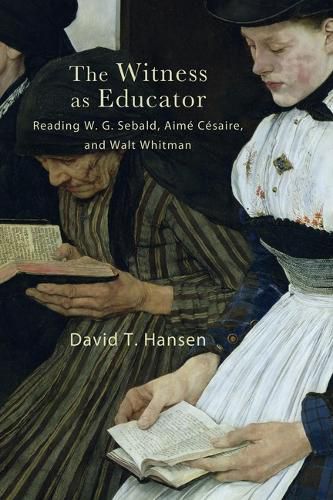Readings Newsletter
Become a Readings Member to make your shopping experience even easier.
Sign in or sign up for free!
You’re not far away from qualifying for FREE standard shipping within Australia
You’ve qualified for FREE standard shipping within Australia
The cart is loading…






Illuminates the power in bearing witness as an ethical orientation toward the world and its people.
In The Witness as Educator, David T. Hansen examines the idea of bearing witness. He shows how it constitutes an ethical orientation that heeds human yearnings for justice, beauty, and meaning. He engages the work of three exemplary witnesses: W. G. Sebald, Aime Cesaire, and Walt Whitman. Sebald powerfully confronts the human costs of the violence of the nineteenth and twentieth centuries. Cesaire evokes a creative Black consciousness in the face of European colonialism and attests to this outlook's joyous and painful development. Whitman's witness to American life, alongside his poignant testimony about caring for wounded soldiers during the American Civil War, speaks to a hope deeper than the prospects of democracy. Hansen shows how these witnesses did not "choose" to write about their respective themes. They had to. The circumstances of their lives and the events of their time summoned them to bear witness. Hansen addresses how their efforts, supplemented by those of other witnesses whose testimony he incorporates, hold considerable educational promise in a world marked by continued misunderstanding and discord and yet also by great possibility.
$9.00 standard shipping within Australia
FREE standard shipping within Australia for orders over $100.00
Express & International shipping calculated at checkout
Illuminates the power in bearing witness as an ethical orientation toward the world and its people.
In The Witness as Educator, David T. Hansen examines the idea of bearing witness. He shows how it constitutes an ethical orientation that heeds human yearnings for justice, beauty, and meaning. He engages the work of three exemplary witnesses: W. G. Sebald, Aime Cesaire, and Walt Whitman. Sebald powerfully confronts the human costs of the violence of the nineteenth and twentieth centuries. Cesaire evokes a creative Black consciousness in the face of European colonialism and attests to this outlook's joyous and painful development. Whitman's witness to American life, alongside his poignant testimony about caring for wounded soldiers during the American Civil War, speaks to a hope deeper than the prospects of democracy. Hansen shows how these witnesses did not "choose" to write about their respective themes. They had to. The circumstances of their lives and the events of their time summoned them to bear witness. Hansen addresses how their efforts, supplemented by those of other witnesses whose testimony he incorporates, hold considerable educational promise in a world marked by continued misunderstanding and discord and yet also by great possibility.